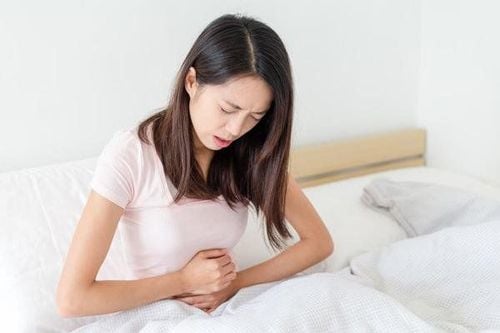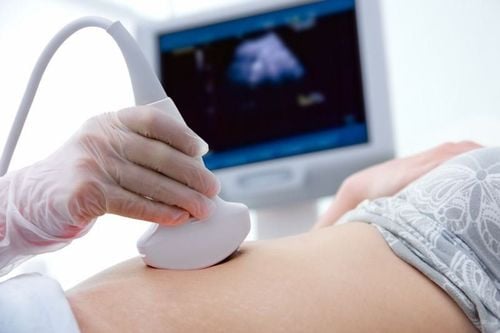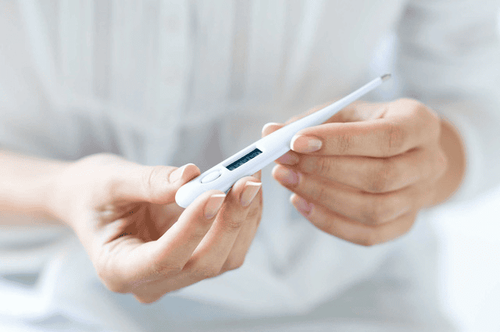This is an automatically translated article.
Premenstrual syndrome is one of the common symptoms in women related to the menstrual cycle. Premenstrual syndrome symptoms such as breast tenderness, mood swings, fatigue, insomnia, nausea, and lower abdominal cramps can be confused with the early symptoms of pregnancy. So how to distinguish these symptoms?
1. What is premenstrual syndrome?
Premenstrual syndrome is a group of physical and mental changes related to the menstrual cycle. Physical symptoms such as breast tenderness, fatigue, joint pain, abdominal cramps and mental symptoms such as emotional changes, irritability, depression. Typically, PMS symptoms occur one to two weeks before your period. They usually stop after menstruation begins.
Symptoms of PMS can be very similar to those of early pregnancy. Therefore, you may need to distinguish the symptoms of PMS from the early signs of pregnancy. This is important to help you detect pregnancy early and have a healthy pregnancy. Here are some symptoms to distinguish
Trắc nghiệm: Bạn có hiểu đúng về dấu hiệu mang thai sớm?
Các dấu hiệu mang thai sớm không phải chỉ mỗi trễ kinh mà còn có rất nhiều dấu hiệu khác như xuất huyết âm đạo, ngực căng tức,… Điểm xem bạn biết được bao nhiêu dấu hiệu mang thai sớm thông qua bài trắc nghiệm này nhé!
2. Breast pain
Premenstrual syndrome: In premenstrual syndrome, breast swelling and pain may occur during the second half of the menstrual cycle. Breast pain can range from mild to severe, and is often most severe right before your period. Women of childbearing age often have more severe symptoms.
Breast tissue can feel rough and dense, especially in the outer regions. You may have a feeling of tightness in your breast and a dull ache. The pain usually improves during your period or soon after when your progesterone levels drop.
Pregnancy: Your breasts during early pregnancy may feel tender, tender, or tender to the touch. They may also feel tighter and heavier. This swelling and pain usually occurs one to two weeks after you conceive, and it can persist for a while as progesterone levels rise due to pregnancy.

3. Vaginal bleeding
Premenstrual syndrome: In general, you won't have any bleeding or spotting if it's premenstrual syndrome. When you have your period, the bleeding is noticeably heavier and can last up to a week.
Pregnancy: For some people, one of the first signs of pregnancy is light vaginal bleeding or spotting that is usually pink or dark brown. This usually happens 10 to 14 days after conception and is usually not enough to absorb an entire sheet of condom. Bleeding usually only lasts for a day or two, so it's shorter than a normal menstrual cycle.
4. Mood swings
Premenstrual syndrome: You may be irritable and feel a bit irritable during PMS. You may also find it easier to cry and feel anxious. These symptoms usually go away after menstruation begins.
Exercise and enough sleep can help you get rid of the moodiness of PMS. However, if you've been feeling sad, overwhelmed, hopeless, or low on energy for two weeks or more, you may be suffering from depression. Be sure to talk to your doctor.
Pregnancy: If you are pregnant, you may have mood swings that last until delivery. You are more likely to be emotional during pregnancy. You may be ecstatic and excited, looking forward to your new family member. You may also have times when you are sad and cry more easily.
As with premenstrual syndrome, mood symptoms during pregnancy can also be a risk factor for depression later in life. If you are concerned about your symptoms and think you may be depressed, talk to your doctor. Depression during pregnancy is very common and it can - and should - be treated.
5. Tired
Premenstrual syndrome: Fatigue or fatigue is common in PMS, as is trouble sleeping. These symptoms should go away when menstruation begins. Exercise can help improve sleep and reduce fatigue.
Pregnancy: When you are pregnant, the increased levels of the hormone progesterone can make you tired. Fatigue may be more obvious during your first trimester, but it can also persist throughout pregnancy. To help your body cope, make sure to eat well and get plenty of sleep.

6. Nausea
Premenstrual syndrome: You shouldn't have nausea or vomiting if your period is late, but some digestive discomfort like nausea can accompany PMS symptoms.
Pregnancy: Morning sickness is one of the most classic and obvious signs when you are pregnant. Nausea episodes usually start a month after you become pregnant. Vomiting may or may not be accompanied by nausea. Despite the name, morning sickness can occur at any time of the day. However, not all women experience morning sickness.
7. Food cravings and dislikes
Premenstrual syndrome: When you have PMS, you will probably notice that your eating habits change. You may crave chocolate, carbohydrates, sugar, sweets, or salty foods. Or you may have cravings. These cravings don't happen to the same extent when you're pregnant.
Pregnancy: You may have particular cravings and you may have no interest in other foods at all. You may also have an aversion to certain smells and tastes, even ones you used to like. These effects can last throughout pregnancy.
You can also have pica, in which you are forced to eat foods that have no nutritional value, such as rocks, dirt, pieces of dry paint or pieces of metal. If you have cravings for non-food items, talk to your doctor right away.
8. Lower abdominal cramps
Premenstrual syndrome: If you have premenstrual syndrome, you may experience dysmenorrhea, which is cramping that occurs 24 to 48 hours before your period. The pain will likely decrease during your period and eventually go away at the end of your period.
Dysmenorrhea usually subsides after your first pregnancy or as you get older. Some women will experience more cramping as they enter menopause.
Pregnancy: During early pregnancy, you may experience mild or mild cramping. These cramps may sound like the mild cramps you get during your period, but they'll be in your lower abdomen or lower back.
If you have a history of miscarriage, do not ignore these symptoms. Rest. If they don't ease, talk to your doctor. You may experience cramping for weeks to months during pregnancy. If you know you're pregnant and these cramps are accompanied by bleeding or watering, see your doctor right away.

9. What is the best way to distinguish premenstrual syndrome from pregnancy?
It is important to know what is causing your symptoms. If you're pregnant, the earlier you find out, the sooner you can get the right care. The best way to tell the difference between PMS symptoms and early pregnancy is to take a pregnancy test.
It can also be helpful to keep track of your symptoms so that you notice when there is a change in your typical pattern. If you have questions or concerns about any of your symptoms, see your doctor.
Gynecological examination is a very important step to help women know their health status as well as their fertility, so that they can have a timely treatment plan if they happen to have it. Where to go for gynecological examination is a question that many women care about. Currently, Vinmec International General Hospital has deployed service packages for examination and screening of basic gynecological diseases.
When registering for the basic gynecological examination and screening package, customers will receive:
Specialized gynecological examination Transvaginal ultrasound of the uterus and ovaries Transvaginal ultrasound of the breasts Tests such as: Treponema pallidum rapid test, Chlamydia rapid test, taking samples for cervical-vaginal cytology, bacterioscopic staining (female vaginal fluid), HPV genotype PCR automated system, Total urinalysis by automatic machine . Any questions that need to be answered by a specialist doctor as well as customers wishing to be examined and treated at Vinmec International General Hospital, please register for an online examination on the Website for the best service.
Please dial HOTLINE for more information or register for an appointment HERE. Download MyVinmec app to make appointments faster and to manage your bookings easily.
Reference source: healthline.com












